Leadership in Nursing: Assessment 2 Essay, August 2019
VerifiedAdded on 2022/12/21
|10
|3370
|67
Essay
AI Summary
This essay explores leadership in nursing through the lens of a case study involving a new graduate nurse and a registrar's interaction. The author, a nursing student, reflects on the situation using the Gibbs reflective cycle, analyzing the actions of the involved parties and their own potential responses. The essay incorporates a personal SWOT analysis to identify leadership strengths and weaknesses. It also discusses clinical leadership expectations for new graduate nurses, emphasizing the importance of respect, communication, and professional behavior. The author proposes an action plan for preventing similar situations, highlighting the significance of training, communication, and assigning duties based on skills. The essay concludes by emphasizing the difference between managers and leaders and the importance of understanding and supporting team members to foster a positive and effective healthcare environment. The student emphasizes the need for continuous professional development and the importance of teamwork in providing quality patient care. The essay also addresses the importance of self-care and building resilience in the nursing profession.
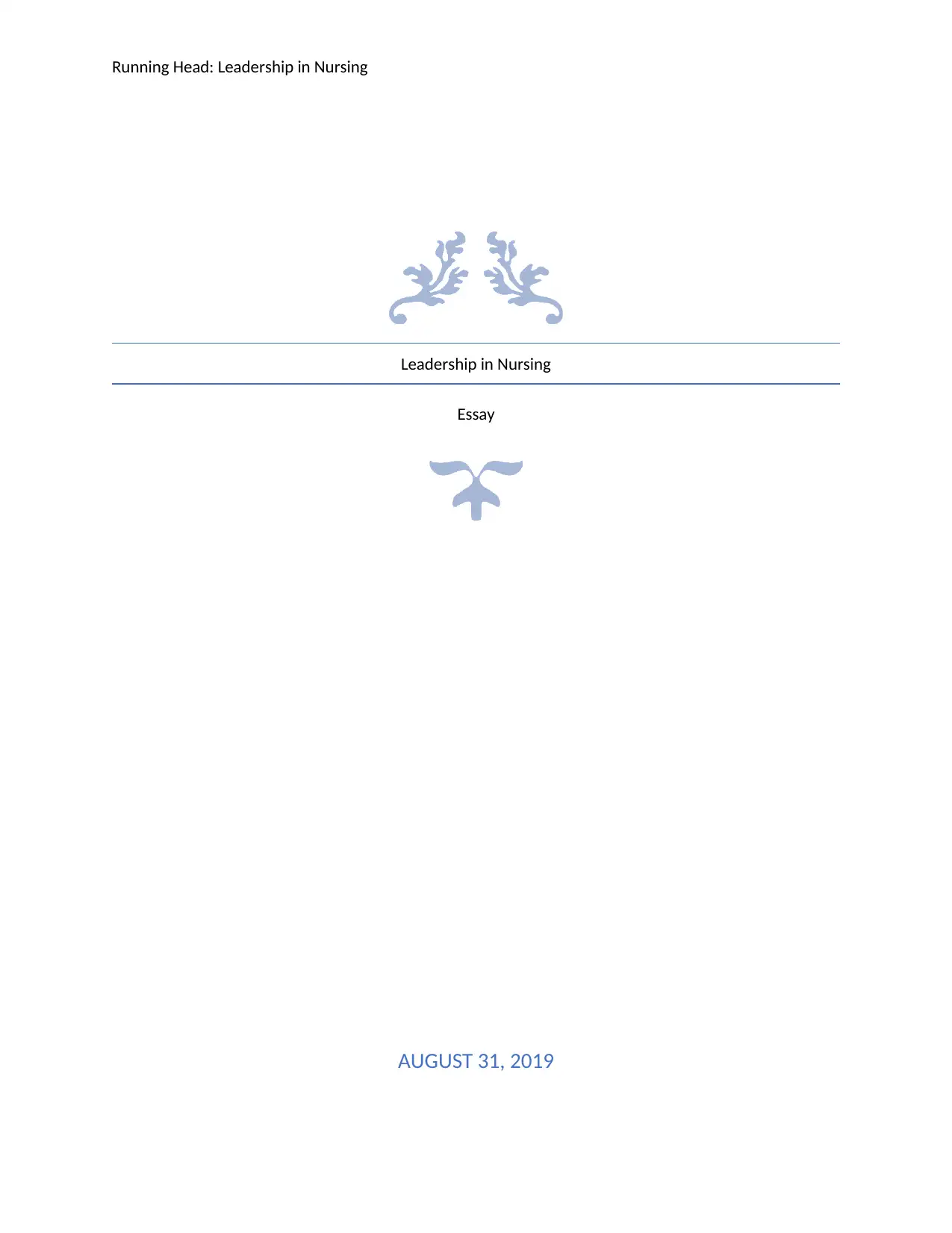
Running Head: Leadership in Nursing
Leadership in Nursing
Essay
AUGUST 31, 2019
Leadership in Nursing
Essay
AUGUST 31, 2019
Paraphrase This Document
Need a fresh take? Get an instant paraphrase of this document with our AI Paraphraser
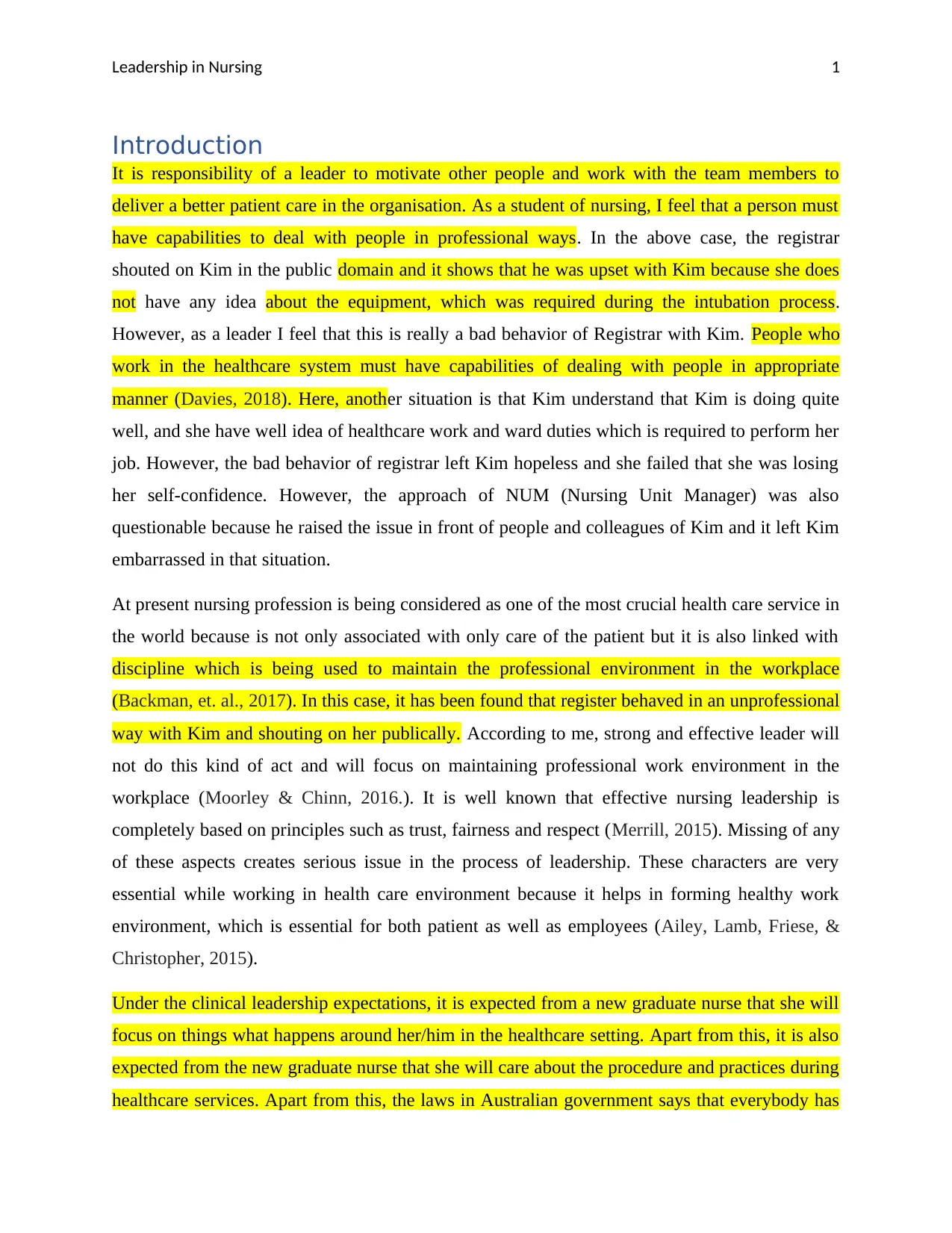
Leadership in Nursing 1
Introduction
It is responsibility of a leader to motivate other people and work with the team members to
deliver a better patient care in the organisation. As a student of nursing, I feel that a person must
have capabilities to deal with people in professional ways. In the above case, the registrar
shouted on Kim in the public domain and it shows that he was upset with Kim because she does
not have any idea about the equipment, which was required during the intubation process.
However, as a leader I feel that this is really a bad behavior of Registrar with Kim. People who
work in the healthcare system must have capabilities of dealing with people in appropriate
manner (Davies, 2018). Here, another situation is that Kim understand that Kim is doing quite
well, and she have well idea of healthcare work and ward duties which is required to perform her
job. However, the bad behavior of registrar left Kim hopeless and she failed that she was losing
her self-confidence. However, the approach of NUM (Nursing Unit Manager) was also
questionable because he raised the issue in front of people and colleagues of Kim and it left Kim
embarrassed in that situation.
At present nursing profession is being considered as one of the most crucial health care service in
the world because is not only associated with only care of the patient but it is also linked with
discipline which is being used to maintain the professional environment in the workplace
(Backman, et. al., 2017). In this case, it has been found that register behaved in an unprofessional
way with Kim and shouting on her publically. According to me, strong and effective leader will
not do this kind of act and will focus on maintaining professional work environment in the
workplace (Moorley & Chinn, 2016.). It is well known that effective nursing leadership is
completely based on principles such as trust, fairness and respect (Merrill, 2015). Missing of any
of these aspects creates serious issue in the process of leadership. These characters are very
essential while working in health care environment because it helps in forming healthy work
environment, which is essential for both patient as well as employees (Ailey, Lamb, Friese, &
Christopher, 2015).
Under the clinical leadership expectations, it is expected from a new graduate nurse that she will
focus on things what happens around her/him in the healthcare setting. Apart from this, it is also
expected from the new graduate nurse that she will care about the procedure and practices during
healthcare services. Apart from this, the laws in Australian government says that everybody has
Introduction
It is responsibility of a leader to motivate other people and work with the team members to
deliver a better patient care in the organisation. As a student of nursing, I feel that a person must
have capabilities to deal with people in professional ways. In the above case, the registrar
shouted on Kim in the public domain and it shows that he was upset with Kim because she does
not have any idea about the equipment, which was required during the intubation process.
However, as a leader I feel that this is really a bad behavior of Registrar with Kim. People who
work in the healthcare system must have capabilities of dealing with people in appropriate
manner (Davies, 2018). Here, another situation is that Kim understand that Kim is doing quite
well, and she have well idea of healthcare work and ward duties which is required to perform her
job. However, the bad behavior of registrar left Kim hopeless and she failed that she was losing
her self-confidence. However, the approach of NUM (Nursing Unit Manager) was also
questionable because he raised the issue in front of people and colleagues of Kim and it left Kim
embarrassed in that situation.
At present nursing profession is being considered as one of the most crucial health care service in
the world because is not only associated with only care of the patient but it is also linked with
discipline which is being used to maintain the professional environment in the workplace
(Backman, et. al., 2017). In this case, it has been found that register behaved in an unprofessional
way with Kim and shouting on her publically. According to me, strong and effective leader will
not do this kind of act and will focus on maintaining professional work environment in the
workplace (Moorley & Chinn, 2016.). It is well known that effective nursing leadership is
completely based on principles such as trust, fairness and respect (Merrill, 2015). Missing of any
of these aspects creates serious issue in the process of leadership. These characters are very
essential while working in health care environment because it helps in forming healthy work
environment, which is essential for both patient as well as employees (Ailey, Lamb, Friese, &
Christopher, 2015).
Under the clinical leadership expectations, it is expected from a new graduate nurse that she will
focus on things what happens around her/him in the healthcare setting. Apart from this, it is also
expected from the new graduate nurse that she will care about the procedure and practices during
healthcare services. Apart from this, the laws in Australian government says that everybody has
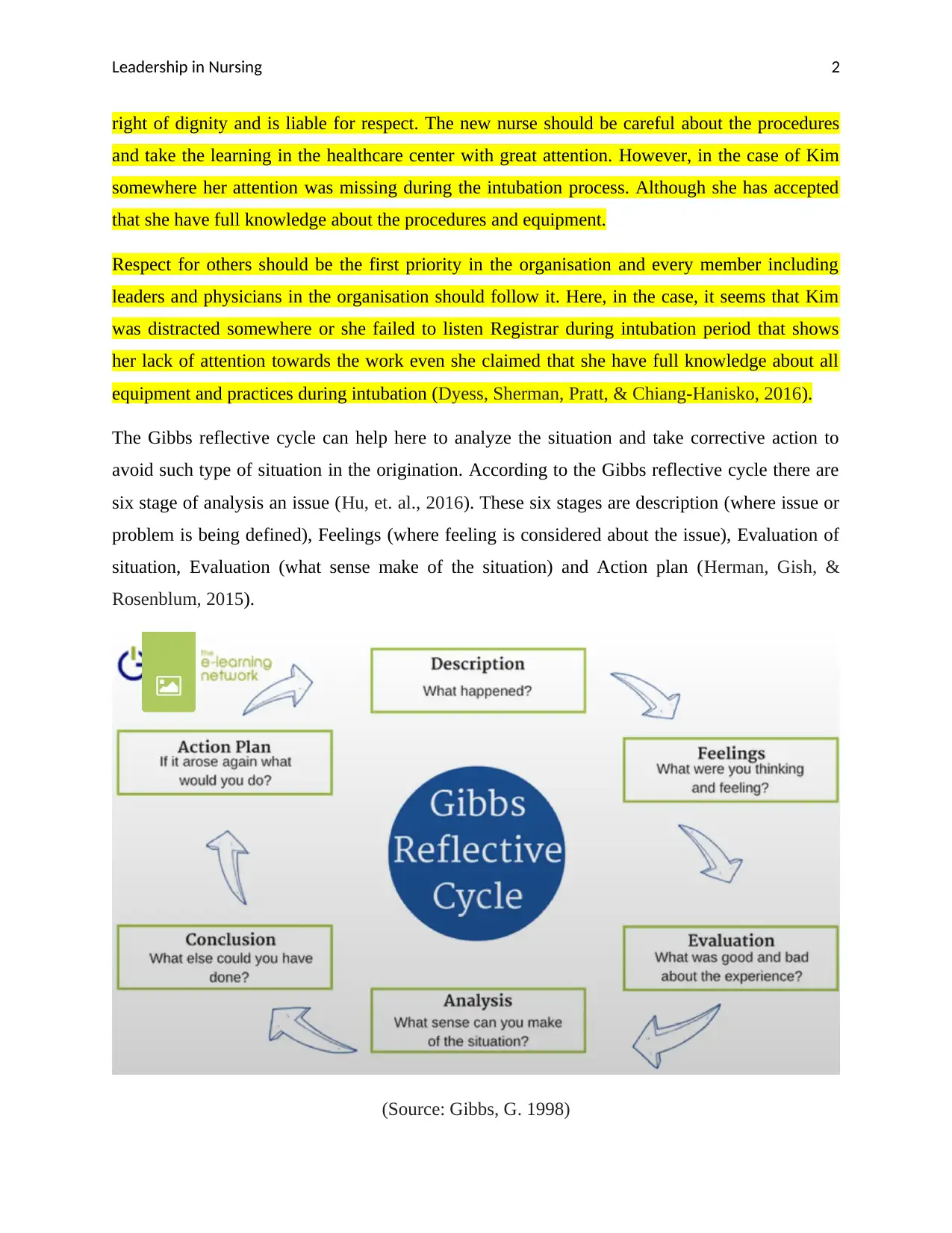
Leadership in Nursing 2
right of dignity and is liable for respect. The new nurse should be careful about the procedures
and take the learning in the healthcare center with great attention. However, in the case of Kim
somewhere her attention was missing during the intubation process. Although she has accepted
that she have full knowledge about the procedures and equipment.
Respect for others should be the first priority in the organisation and every member including
leaders and physicians in the organisation should follow it. Here, in the case, it seems that Kim
was distracted somewhere or she failed to listen Registrar during intubation period that shows
her lack of attention towards the work even she claimed that she have full knowledge about all
equipment and practices during intubation (Dyess, Sherman, Pratt, & Chiang-Hanisko, 2016).
The Gibbs reflective cycle can help here to analyze the situation and take corrective action to
avoid such type of situation in the origination. According to the Gibbs reflective cycle there are
six stage of analysis an issue (Hu, et. al., 2016). These six stages are description (where issue or
problem is being defined), Feelings (where feeling is considered about the issue), Evaluation of
situation, Evaluation (what sense make of the situation) and Action plan (Herman, Gish, &
Rosenblum, 2015).
(Source: Gibbs, G. 1998)
right of dignity and is liable for respect. The new nurse should be careful about the procedures
and take the learning in the healthcare center with great attention. However, in the case of Kim
somewhere her attention was missing during the intubation process. Although she has accepted
that she have full knowledge about the procedures and equipment.
Respect for others should be the first priority in the organisation and every member including
leaders and physicians in the organisation should follow it. Here, in the case, it seems that Kim
was distracted somewhere or she failed to listen Registrar during intubation period that shows
her lack of attention towards the work even she claimed that she have full knowledge about all
equipment and practices during intubation (Dyess, Sherman, Pratt, & Chiang-Hanisko, 2016).
The Gibbs reflective cycle can help here to analyze the situation and take corrective action to
avoid such type of situation in the origination. According to the Gibbs reflective cycle there are
six stage of analysis an issue (Hu, et. al., 2016). These six stages are description (where issue or
problem is being defined), Feelings (where feeling is considered about the issue), Evaluation of
situation, Evaluation (what sense make of the situation) and Action plan (Herman, Gish, &
Rosenblum, 2015).
(Source: Gibbs, G. 1998)
⊘ This is a preview!⊘
Do you want full access?
Subscribe today to unlock all pages.

Trusted by 1+ million students worldwide
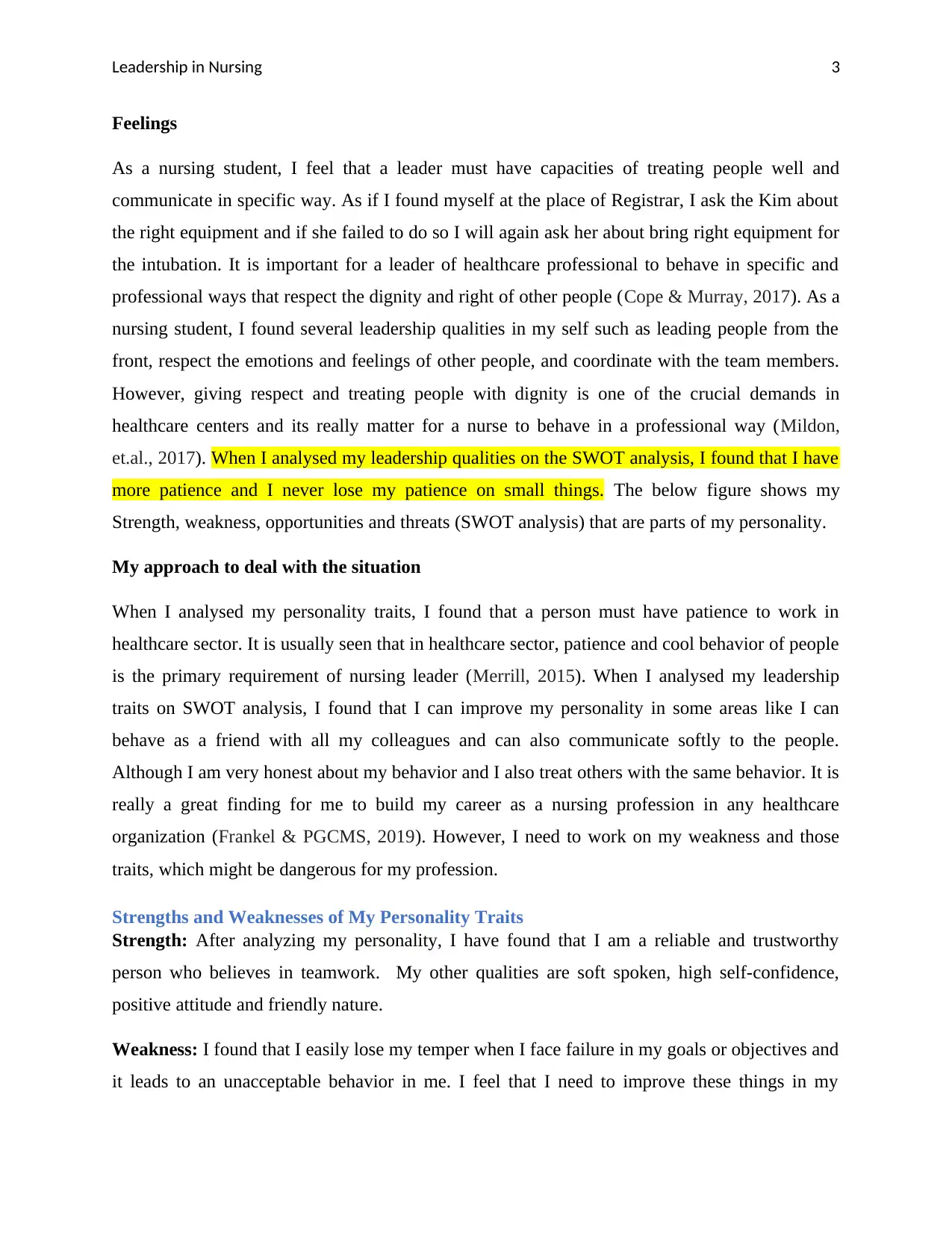
Leadership in Nursing 3
Feelings
As a nursing student, I feel that a leader must have capacities of treating people well and
communicate in specific way. As if I found myself at the place of Registrar, I ask the Kim about
the right equipment and if she failed to do so I will again ask her about bring right equipment for
the intubation. It is important for a leader of healthcare professional to behave in specific and
professional ways that respect the dignity and right of other people (Cope & Murray, 2017). As a
nursing student, I found several leadership qualities in my self such as leading people from the
front, respect the emotions and feelings of other people, and coordinate with the team members.
However, giving respect and treating people with dignity is one of the crucial demands in
healthcare centers and its really matter for a nurse to behave in a professional way (Mildon,
et.al., 2017). When I analysed my leadership qualities on the SWOT analysis, I found that I have
more patience and I never lose my patience on small things. The below figure shows my
Strength, weakness, opportunities and threats (SWOT analysis) that are parts of my personality.
My approach to deal with the situation
When I analysed my personality traits, I found that a person must have patience to work in
healthcare sector. It is usually seen that in healthcare sector, patience and cool behavior of people
is the primary requirement of nursing leader (Merrill, 2015). When I analysed my leadership
traits on SWOT analysis, I found that I can improve my personality in some areas like I can
behave as a friend with all my colleagues and can also communicate softly to the people.
Although I am very honest about my behavior and I also treat others with the same behavior. It is
really a great finding for me to build my career as a nursing profession in any healthcare
organization (Frankel & PGCMS, 2019). However, I need to work on my weakness and those
traits, which might be dangerous for my profession.
Strengths and Weaknesses of My Personality Traits
Strength: After analyzing my personality, I have found that I am a reliable and trustworthy
person who believes in teamwork. My other qualities are soft spoken, high self-confidence,
positive attitude and friendly nature.
Weakness: I found that I easily lose my temper when I face failure in my goals or objectives and
it leads to an unacceptable behavior in me. I feel that I need to improve these things in my
Feelings
As a nursing student, I feel that a leader must have capacities of treating people well and
communicate in specific way. As if I found myself at the place of Registrar, I ask the Kim about
the right equipment and if she failed to do so I will again ask her about bring right equipment for
the intubation. It is important for a leader of healthcare professional to behave in specific and
professional ways that respect the dignity and right of other people (Cope & Murray, 2017). As a
nursing student, I found several leadership qualities in my self such as leading people from the
front, respect the emotions and feelings of other people, and coordinate with the team members.
However, giving respect and treating people with dignity is one of the crucial demands in
healthcare centers and its really matter for a nurse to behave in a professional way (Mildon,
et.al., 2017). When I analysed my leadership qualities on the SWOT analysis, I found that I have
more patience and I never lose my patience on small things. The below figure shows my
Strength, weakness, opportunities and threats (SWOT analysis) that are parts of my personality.
My approach to deal with the situation
When I analysed my personality traits, I found that a person must have patience to work in
healthcare sector. It is usually seen that in healthcare sector, patience and cool behavior of people
is the primary requirement of nursing leader (Merrill, 2015). When I analysed my leadership
traits on SWOT analysis, I found that I can improve my personality in some areas like I can
behave as a friend with all my colleagues and can also communicate softly to the people.
Although I am very honest about my behavior and I also treat others with the same behavior. It is
really a great finding for me to build my career as a nursing profession in any healthcare
organization (Frankel & PGCMS, 2019). However, I need to work on my weakness and those
traits, which might be dangerous for my profession.
Strengths and Weaknesses of My Personality Traits
Strength: After analyzing my personality, I have found that I am a reliable and trustworthy
person who believes in teamwork. My other qualities are soft spoken, high self-confidence,
positive attitude and friendly nature.
Weakness: I found that I easily lose my temper when I face failure in my goals or objectives and
it leads to an unacceptable behavior in me. I feel that I need to improve these things in my
Paraphrase This Document
Need a fresh take? Get an instant paraphrase of this document with our AI Paraphraser
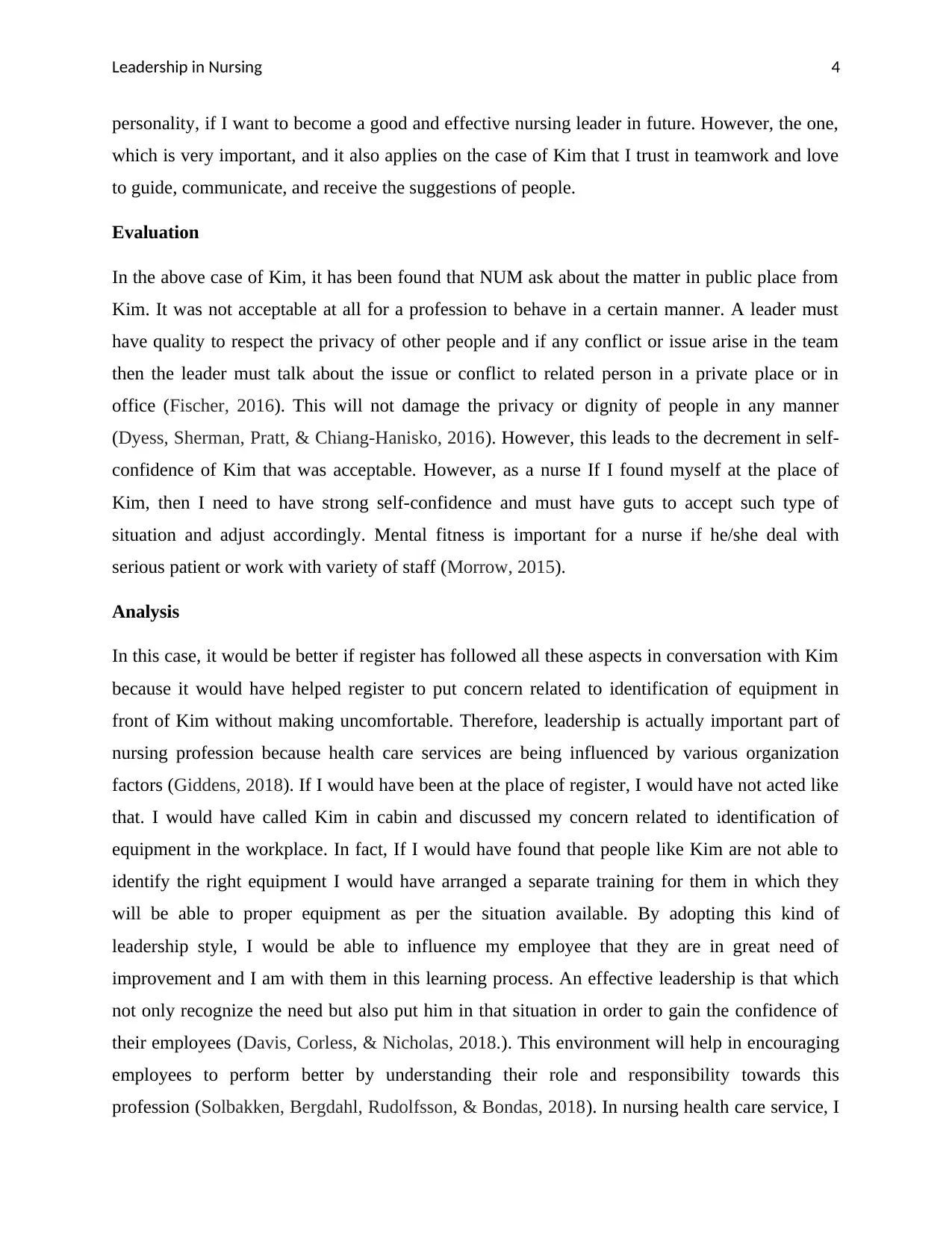
Leadership in Nursing 4
personality, if I want to become a good and effective nursing leader in future. However, the one,
which is very important, and it also applies on the case of Kim that I trust in teamwork and love
to guide, communicate, and receive the suggestions of people.
Evaluation
In the above case of Kim, it has been found that NUM ask about the matter in public place from
Kim. It was not acceptable at all for a profession to behave in a certain manner. A leader must
have quality to respect the privacy of other people and if any conflict or issue arise in the team
then the leader must talk about the issue or conflict to related person in a private place or in
office (Fischer, 2016). This will not damage the privacy or dignity of people in any manner
(Dyess, Sherman, Pratt, & Chiang-Hanisko, 2016). However, this leads to the decrement in self-
confidence of Kim that was acceptable. However, as a nurse If I found myself at the place of
Kim, then I need to have strong self-confidence and must have guts to accept such type of
situation and adjust accordingly. Mental fitness is important for a nurse if he/she deal with
serious patient or work with variety of staff (Morrow, 2015).
Analysis
In this case, it would be better if register has followed all these aspects in conversation with Kim
because it would have helped register to put concern related to identification of equipment in
front of Kim without making uncomfortable. Therefore, leadership is actually important part of
nursing profession because health care services are being influenced by various organization
factors (Giddens, 2018). If I would have been at the place of register, I would have not acted like
that. I would have called Kim in cabin and discussed my concern related to identification of
equipment in the workplace. In fact, If I would have found that people like Kim are not able to
identify the right equipment I would have arranged a separate training for them in which they
will be able to proper equipment as per the situation available. By adopting this kind of
leadership style, I would be able to influence my employee that they are in great need of
improvement and I am with them in this learning process. An effective leadership is that which
not only recognize the need but also put him in that situation in order to gain the confidence of
their employees (Davis, Corless, & Nicholas, 2018.). This environment will help in encouraging
employees to perform better by understanding their role and responsibility towards this
profession (Solbakken, Bergdahl, Rudolfsson, & Bondas, 2018). In nursing health care service, I
personality, if I want to become a good and effective nursing leader in future. However, the one,
which is very important, and it also applies on the case of Kim that I trust in teamwork and love
to guide, communicate, and receive the suggestions of people.
Evaluation
In the above case of Kim, it has been found that NUM ask about the matter in public place from
Kim. It was not acceptable at all for a profession to behave in a certain manner. A leader must
have quality to respect the privacy of other people and if any conflict or issue arise in the team
then the leader must talk about the issue or conflict to related person in a private place or in
office (Fischer, 2016). This will not damage the privacy or dignity of people in any manner
(Dyess, Sherman, Pratt, & Chiang-Hanisko, 2016). However, this leads to the decrement in self-
confidence of Kim that was acceptable. However, as a nurse If I found myself at the place of
Kim, then I need to have strong self-confidence and must have guts to accept such type of
situation and adjust accordingly. Mental fitness is important for a nurse if he/she deal with
serious patient or work with variety of staff (Morrow, 2015).
Analysis
In this case, it would be better if register has followed all these aspects in conversation with Kim
because it would have helped register to put concern related to identification of equipment in
front of Kim without making uncomfortable. Therefore, leadership is actually important part of
nursing profession because health care services are being influenced by various organization
factors (Giddens, 2018). If I would have been at the place of register, I would have not acted like
that. I would have called Kim in cabin and discussed my concern related to identification of
equipment in the workplace. In fact, If I would have found that people like Kim are not able to
identify the right equipment I would have arranged a separate training for them in which they
will be able to proper equipment as per the situation available. By adopting this kind of
leadership style, I would be able to influence my employee that they are in great need of
improvement and I am with them in this learning process. An effective leadership is that which
not only recognize the need but also put him in that situation in order to gain the confidence of
their employees (Davis, Corless, & Nicholas, 2018.). This environment will help in encouraging
employees to perform better by understanding their role and responsibility towards this
profession (Solbakken, Bergdahl, Rudolfsson, & Bondas, 2018). In nursing health care service, I
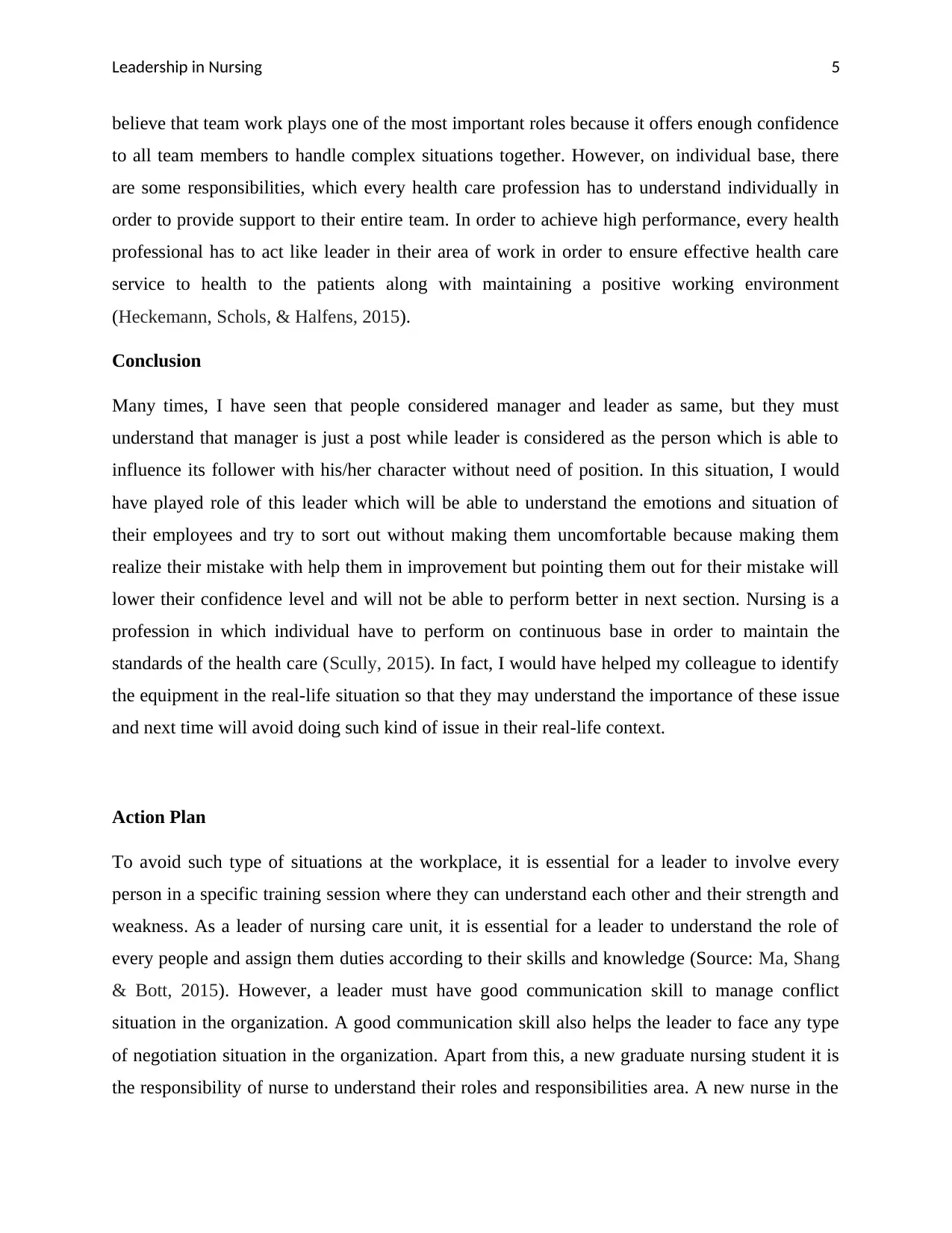
Leadership in Nursing 5
believe that team work plays one of the most important roles because it offers enough confidence
to all team members to handle complex situations together. However, on individual base, there
are some responsibilities, which every health care profession has to understand individually in
order to provide support to their entire team. In order to achieve high performance, every health
professional has to act like leader in their area of work in order to ensure effective health care
service to health to the patients along with maintaining a positive working environment
(Heckemann, Schols, & Halfens, 2015).
Conclusion
Many times, I have seen that people considered manager and leader as same, but they must
understand that manager is just a post while leader is considered as the person which is able to
influence its follower with his/her character without need of position. In this situation, I would
have played role of this leader which will be able to understand the emotions and situation of
their employees and try to sort out without making them uncomfortable because making them
realize their mistake with help them in improvement but pointing them out for their mistake will
lower their confidence level and will not be able to perform better in next section. Nursing is a
profession in which individual have to perform on continuous base in order to maintain the
standards of the health care (Scully, 2015). In fact, I would have helped my colleague to identify
the equipment in the real-life situation so that they may understand the importance of these issue
and next time will avoid doing such kind of issue in their real-life context.
Action Plan
To avoid such type of situations at the workplace, it is essential for a leader to involve every
person in a specific training session where they can understand each other and their strength and
weakness. As a leader of nursing care unit, it is essential for a leader to understand the role of
every people and assign them duties according to their skills and knowledge (Source: Ma, Shang
& Bott, 2015). However, a leader must have good communication skill to manage conflict
situation in the organization. A good communication skill also helps the leader to face any type
of negotiation situation in the organization. Apart from this, a new graduate nursing student it is
the responsibility of nurse to understand their roles and responsibilities area. A new nurse in the
believe that team work plays one of the most important roles because it offers enough confidence
to all team members to handle complex situations together. However, on individual base, there
are some responsibilities, which every health care profession has to understand individually in
order to provide support to their entire team. In order to achieve high performance, every health
professional has to act like leader in their area of work in order to ensure effective health care
service to health to the patients along with maintaining a positive working environment
(Heckemann, Schols, & Halfens, 2015).
Conclusion
Many times, I have seen that people considered manager and leader as same, but they must
understand that manager is just a post while leader is considered as the person which is able to
influence its follower with his/her character without need of position. In this situation, I would
have played role of this leader which will be able to understand the emotions and situation of
their employees and try to sort out without making them uncomfortable because making them
realize their mistake with help them in improvement but pointing them out for their mistake will
lower their confidence level and will not be able to perform better in next section. Nursing is a
profession in which individual have to perform on continuous base in order to maintain the
standards of the health care (Scully, 2015). In fact, I would have helped my colleague to identify
the equipment in the real-life situation so that they may understand the importance of these issue
and next time will avoid doing such kind of issue in their real-life context.
Action Plan
To avoid such type of situations at the workplace, it is essential for a leader to involve every
person in a specific training session where they can understand each other and their strength and
weakness. As a leader of nursing care unit, it is essential for a leader to understand the role of
every people and assign them duties according to their skills and knowledge (Source: Ma, Shang
& Bott, 2015). However, a leader must have good communication skill to manage conflict
situation in the organization. A good communication skill also helps the leader to face any type
of negotiation situation in the organization. Apart from this, a new graduate nursing student it is
the responsibility of nurse to understand their roles and responsibilities area. A new nurse in the
⊘ This is a preview!⊘
Do you want full access?
Subscribe today to unlock all pages.

Trusted by 1+ million students worldwide
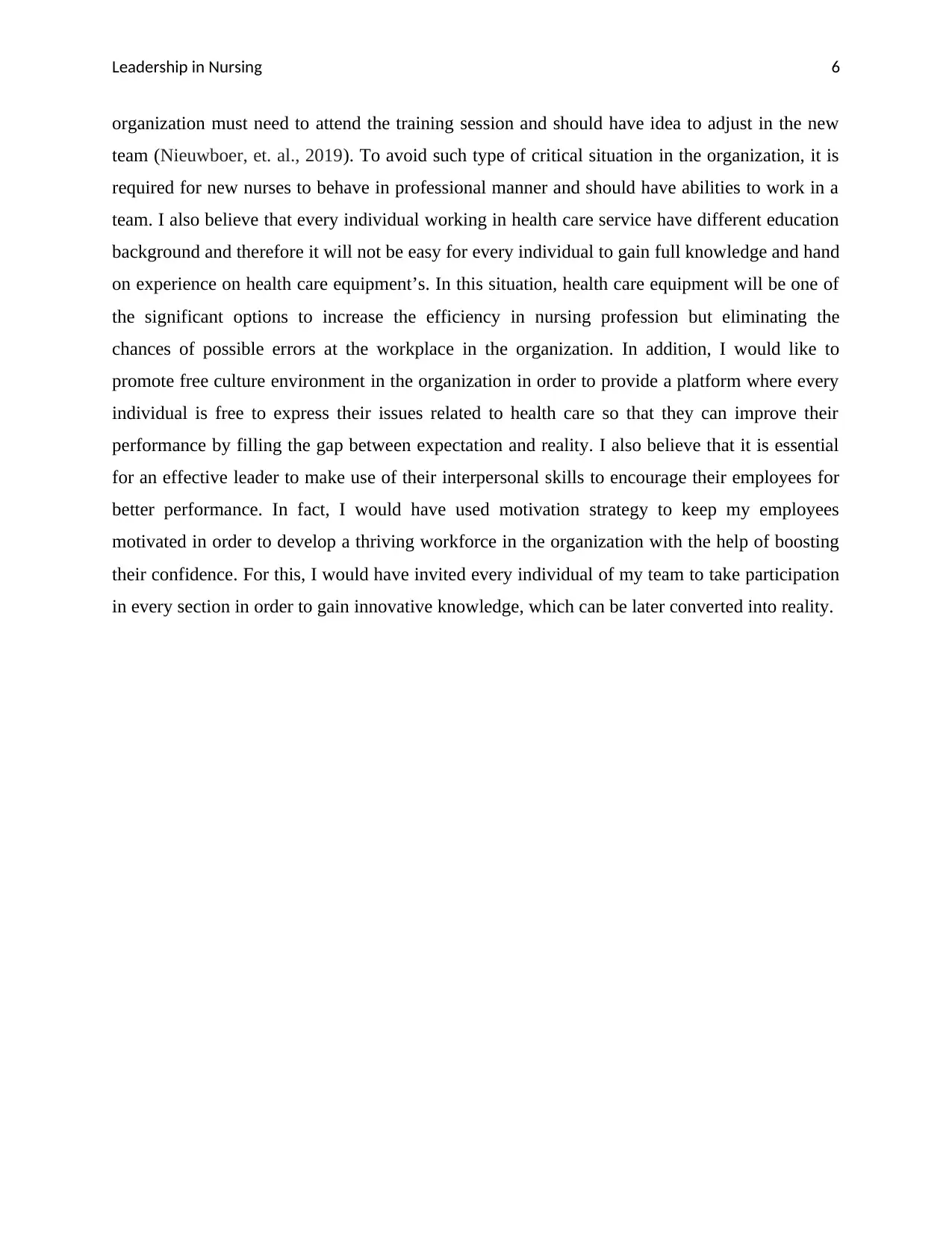
Leadership in Nursing 6
organization must need to attend the training session and should have idea to adjust in the new
team (Nieuwboer, et. al., 2019). To avoid such type of critical situation in the organization, it is
required for new nurses to behave in professional manner and should have abilities to work in a
team. I also believe that every individual working in health care service have different education
background and therefore it will not be easy for every individual to gain full knowledge and hand
on experience on health care equipment’s. In this situation, health care equipment will be one of
the significant options to increase the efficiency in nursing profession but eliminating the
chances of possible errors at the workplace in the organization. In addition, I would like to
promote free culture environment in the organization in order to provide a platform where every
individual is free to express their issues related to health care so that they can improve their
performance by filling the gap between expectation and reality. I also believe that it is essential
for an effective leader to make use of their interpersonal skills to encourage their employees for
better performance. In fact, I would have used motivation strategy to keep my employees
motivated in order to develop a thriving workforce in the organization with the help of boosting
their confidence. For this, I would have invited every individual of my team to take participation
in every section in order to gain innovative knowledge, which can be later converted into reality.
organization must need to attend the training session and should have idea to adjust in the new
team (Nieuwboer, et. al., 2019). To avoid such type of critical situation in the organization, it is
required for new nurses to behave in professional manner and should have abilities to work in a
team. I also believe that every individual working in health care service have different education
background and therefore it will not be easy for every individual to gain full knowledge and hand
on experience on health care equipment’s. In this situation, health care equipment will be one of
the significant options to increase the efficiency in nursing profession but eliminating the
chances of possible errors at the workplace in the organization. In addition, I would like to
promote free culture environment in the organization in order to provide a platform where every
individual is free to express their issues related to health care so that they can improve their
performance by filling the gap between expectation and reality. I also believe that it is essential
for an effective leader to make use of their interpersonal skills to encourage their employees for
better performance. In fact, I would have used motivation strategy to keep my employees
motivated in order to develop a thriving workforce in the organization with the help of boosting
their confidence. For this, I would have invited every individual of my team to take participation
in every section in order to gain innovative knowledge, which can be later converted into reality.
Paraphrase This Document
Need a fresh take? Get an instant paraphrase of this document with our AI Paraphraser
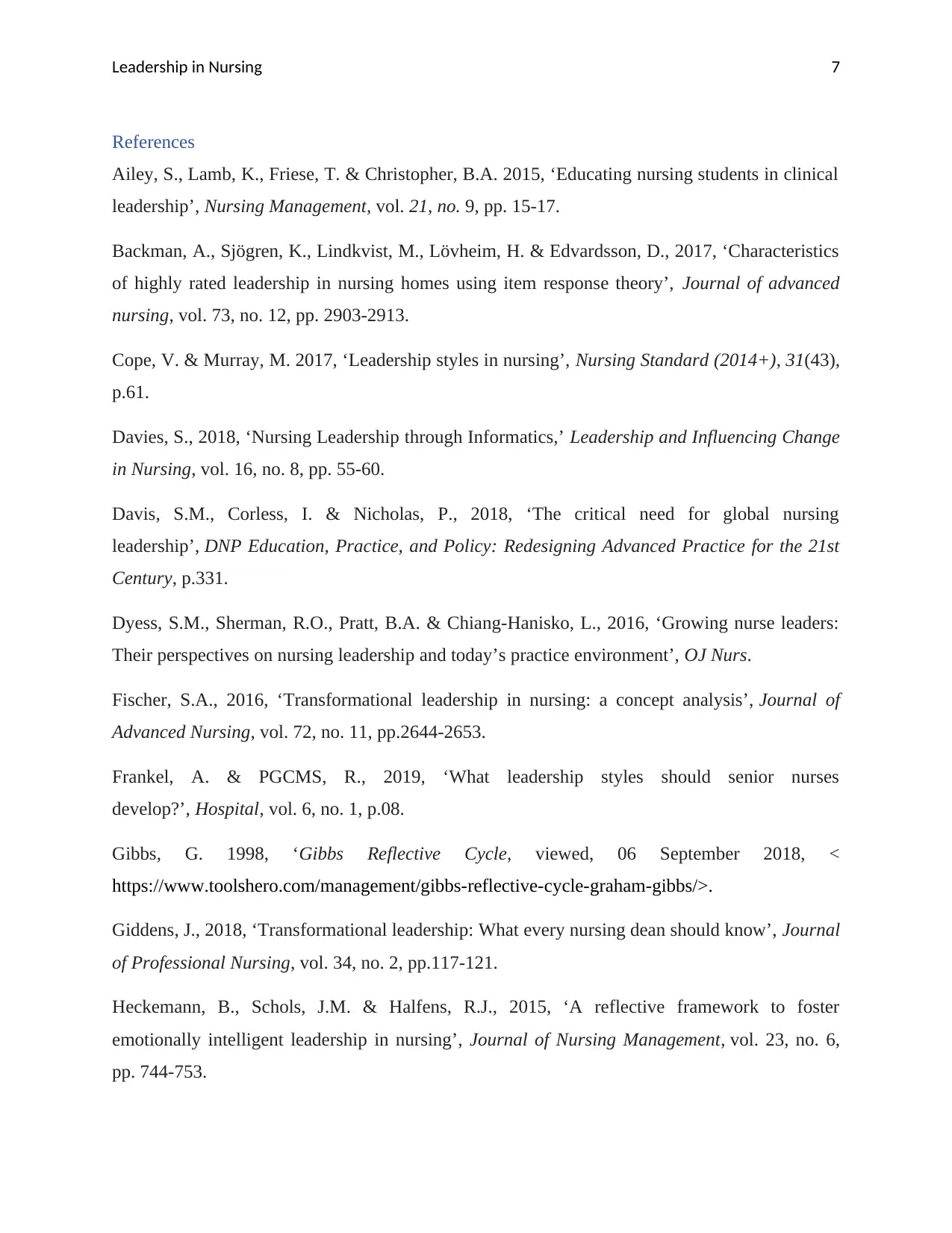
Leadership in Nursing 7
References
Ailey, S., Lamb, K., Friese, T. & Christopher, B.A. 2015, ‘Educating nursing students in clinical
leadership’, Nursing Management, vol. 21, no. 9, pp. 15-17.
Backman, A., Sjögren, K., Lindkvist, M., Lövheim, H. & Edvardsson, D., 2017, ‘Characteristics
of highly rated leadership in nursing homes using item response theory’, Journal of advanced
nursing, vol. 73, no. 12, pp. 2903-2913.
Cope, V. & Murray, M. 2017, ‘Leadership styles in nursing’, Nursing Standard (2014+), 31(43),
p.61.
Davies, S., 2018, ‘Nursing Leadership through Informatics,’ Leadership and Influencing Change
in Nursing, vol. 16, no. 8, pp. 55-60.
Davis, S.M., Corless, I. & Nicholas, P., 2018, ‘The critical need for global nursing
leadership’, DNP Education, Practice, and Policy: Redesigning Advanced Practice for the 21st
Century, p.331.
Dyess, S.M., Sherman, R.O., Pratt, B.A. & Chiang-Hanisko, L., 2016, ‘Growing nurse leaders:
Their perspectives on nursing leadership and today’s practice environment’, OJ Nurs.
Fischer, S.A., 2016, ‘Transformational leadership in nursing: a concept analysis’, Journal of
Advanced Nursing, vol. 72, no. 11, pp.2644-2653.
Frankel, A. & PGCMS, R., 2019, ‘What leadership styles should senior nurses
develop?’, Hospital, vol. 6, no. 1, p.08.
Gibbs, G. 1998, ‘Gibbs Reflective Cycle, viewed, 06 September 2018, <
https://www.toolshero.com/management/gibbs-reflective-cycle-graham-gibbs/>.
Giddens, J., 2018, ‘Transformational leadership: What every nursing dean should know’, Journal
of Professional Nursing, vol. 34, no. 2, pp.117-121.
Heckemann, B., Schols, J.M. & Halfens, R.J., 2015, ‘A reflective framework to foster
emotionally intelligent leadership in nursing’, Journal of Nursing Management, vol. 23, no. 6,
pp. 744-753.
References
Ailey, S., Lamb, K., Friese, T. & Christopher, B.A. 2015, ‘Educating nursing students in clinical
leadership’, Nursing Management, vol. 21, no. 9, pp. 15-17.
Backman, A., Sjögren, K., Lindkvist, M., Lövheim, H. & Edvardsson, D., 2017, ‘Characteristics
of highly rated leadership in nursing homes using item response theory’, Journal of advanced
nursing, vol. 73, no. 12, pp. 2903-2913.
Cope, V. & Murray, M. 2017, ‘Leadership styles in nursing’, Nursing Standard (2014+), 31(43),
p.61.
Davies, S., 2018, ‘Nursing Leadership through Informatics,’ Leadership and Influencing Change
in Nursing, vol. 16, no. 8, pp. 55-60.
Davis, S.M., Corless, I. & Nicholas, P., 2018, ‘The critical need for global nursing
leadership’, DNP Education, Practice, and Policy: Redesigning Advanced Practice for the 21st
Century, p.331.
Dyess, S.M., Sherman, R.O., Pratt, B.A. & Chiang-Hanisko, L., 2016, ‘Growing nurse leaders:
Their perspectives on nursing leadership and today’s practice environment’, OJ Nurs.
Fischer, S.A., 2016, ‘Transformational leadership in nursing: a concept analysis’, Journal of
Advanced Nursing, vol. 72, no. 11, pp.2644-2653.
Frankel, A. & PGCMS, R., 2019, ‘What leadership styles should senior nurses
develop?’, Hospital, vol. 6, no. 1, p.08.
Gibbs, G. 1998, ‘Gibbs Reflective Cycle, viewed, 06 September 2018, <
https://www.toolshero.com/management/gibbs-reflective-cycle-graham-gibbs/>.
Giddens, J., 2018, ‘Transformational leadership: What every nursing dean should know’, Journal
of Professional Nursing, vol. 34, no. 2, pp.117-121.
Heckemann, B., Schols, J.M. & Halfens, R.J., 2015, ‘A reflective framework to foster
emotionally intelligent leadership in nursing’, Journal of Nursing Management, vol. 23, no. 6,
pp. 744-753.
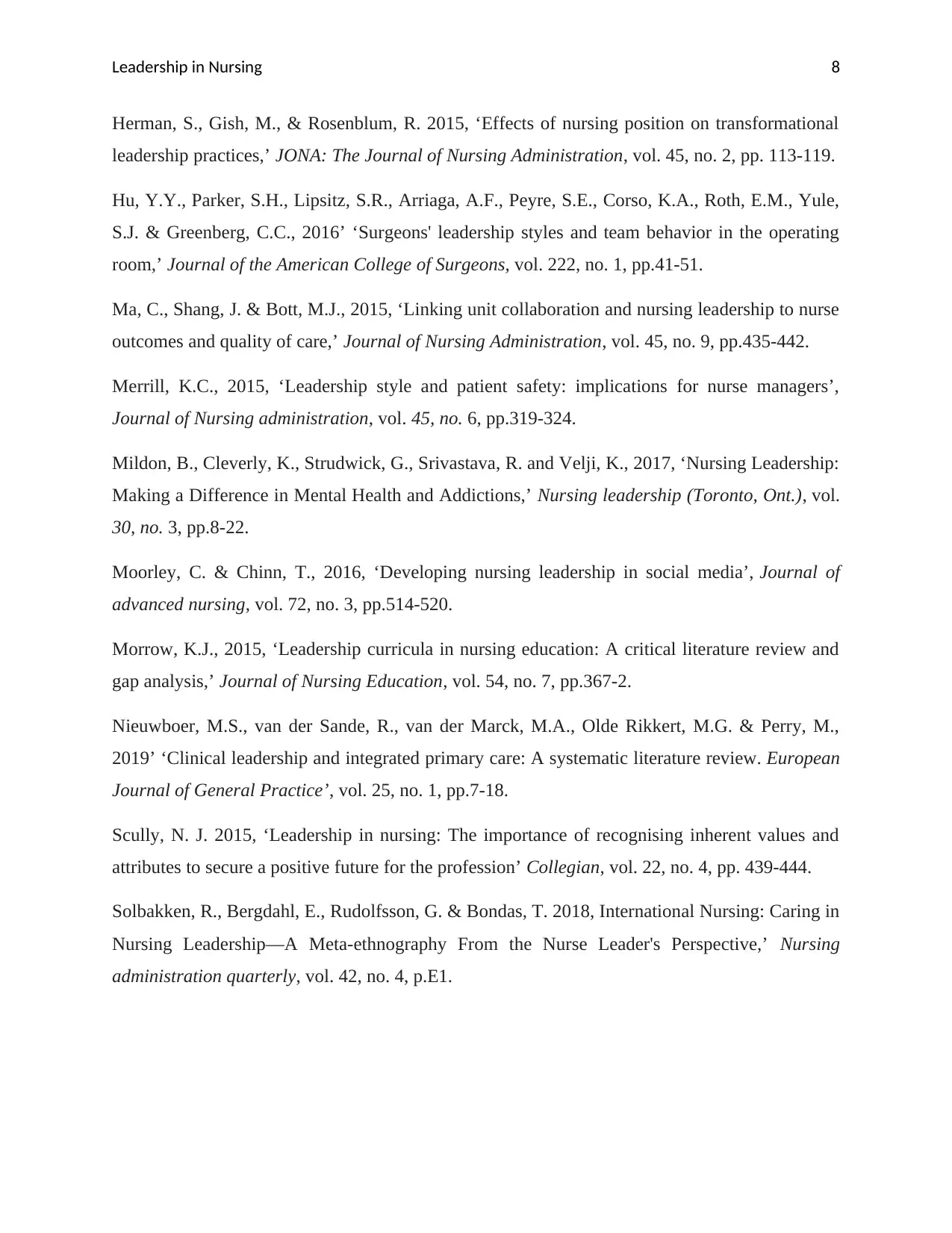
Leadership in Nursing 8
Herman, S., Gish, M., & Rosenblum, R. 2015, ‘Effects of nursing position on transformational
leadership practices,’ JONA: The Journal of Nursing Administration, vol. 45, no. 2, pp. 113-119.
Hu, Y.Y., Parker, S.H., Lipsitz, S.R., Arriaga, A.F., Peyre, S.E., Corso, K.A., Roth, E.M., Yule,
S.J. & Greenberg, C.C., 2016’ ‘Surgeons' leadership styles and team behavior in the operating
room,’ Journal of the American College of Surgeons, vol. 222, no. 1, pp.41-51.
Ma, C., Shang, J. & Bott, M.J., 2015, ‘Linking unit collaboration and nursing leadership to nurse
outcomes and quality of care,’ Journal of Nursing Administration, vol. 45, no. 9, pp.435-442.
Merrill, K.C., 2015, ‘Leadership style and patient safety: implications for nurse managers’,
Journal of Nursing administration, vol. 45, no. 6, pp.319-324.
Mildon, B., Cleverly, K., Strudwick, G., Srivastava, R. and Velji, K., 2017, ‘Nursing Leadership:
Making a Difference in Mental Health and Addictions,’ Nursing leadership (Toronto, Ont.), vol.
30, no. 3, pp.8-22.
Moorley, C. & Chinn, T., 2016, ‘Developing nursing leadership in social media’, Journal of
advanced nursing, vol. 72, no. 3, pp.514-520.
Morrow, K.J., 2015, ‘Leadership curricula in nursing education: A critical literature review and
gap analysis,’ Journal of Nursing Education, vol. 54, no. 7, pp.367-2.
Nieuwboer, M.S., van der Sande, R., van der Marck, M.A., Olde Rikkert, M.G. & Perry, M.,
2019’ ‘Clinical leadership and integrated primary care: A systematic literature review. European
Journal of General Practice’, vol. 25, no. 1, pp.7-18.
Scully, N. J. 2015, ‘Leadership in nursing: The importance of recognising inherent values and
attributes to secure a positive future for the profession’ Collegian, vol. 22, no. 4, pp. 439-444.
Solbakken, R., Bergdahl, E., Rudolfsson, G. & Bondas, T. 2018, International Nursing: Caring in
Nursing Leadership—A Meta-ethnography From the Nurse Leader's Perspective,’ Nursing
administration quarterly, vol. 42, no. 4, p.E1.
Herman, S., Gish, M., & Rosenblum, R. 2015, ‘Effects of nursing position on transformational
leadership practices,’ JONA: The Journal of Nursing Administration, vol. 45, no. 2, pp. 113-119.
Hu, Y.Y., Parker, S.H., Lipsitz, S.R., Arriaga, A.F., Peyre, S.E., Corso, K.A., Roth, E.M., Yule,
S.J. & Greenberg, C.C., 2016’ ‘Surgeons' leadership styles and team behavior in the operating
room,’ Journal of the American College of Surgeons, vol. 222, no. 1, pp.41-51.
Ma, C., Shang, J. & Bott, M.J., 2015, ‘Linking unit collaboration and nursing leadership to nurse
outcomes and quality of care,’ Journal of Nursing Administration, vol. 45, no. 9, pp.435-442.
Merrill, K.C., 2015, ‘Leadership style and patient safety: implications for nurse managers’,
Journal of Nursing administration, vol. 45, no. 6, pp.319-324.
Mildon, B., Cleverly, K., Strudwick, G., Srivastava, R. and Velji, K., 2017, ‘Nursing Leadership:
Making a Difference in Mental Health and Addictions,’ Nursing leadership (Toronto, Ont.), vol.
30, no. 3, pp.8-22.
Moorley, C. & Chinn, T., 2016, ‘Developing nursing leadership in social media’, Journal of
advanced nursing, vol. 72, no. 3, pp.514-520.
Morrow, K.J., 2015, ‘Leadership curricula in nursing education: A critical literature review and
gap analysis,’ Journal of Nursing Education, vol. 54, no. 7, pp.367-2.
Nieuwboer, M.S., van der Sande, R., van der Marck, M.A., Olde Rikkert, M.G. & Perry, M.,
2019’ ‘Clinical leadership and integrated primary care: A systematic literature review. European
Journal of General Practice’, vol. 25, no. 1, pp.7-18.
Scully, N. J. 2015, ‘Leadership in nursing: The importance of recognising inherent values and
attributes to secure a positive future for the profession’ Collegian, vol. 22, no. 4, pp. 439-444.
Solbakken, R., Bergdahl, E., Rudolfsson, G. & Bondas, T. 2018, International Nursing: Caring in
Nursing Leadership—A Meta-ethnography From the Nurse Leader's Perspective,’ Nursing
administration quarterly, vol. 42, no. 4, p.E1.
⊘ This is a preview!⊘
Do you want full access?
Subscribe today to unlock all pages.

Trusted by 1+ million students worldwide
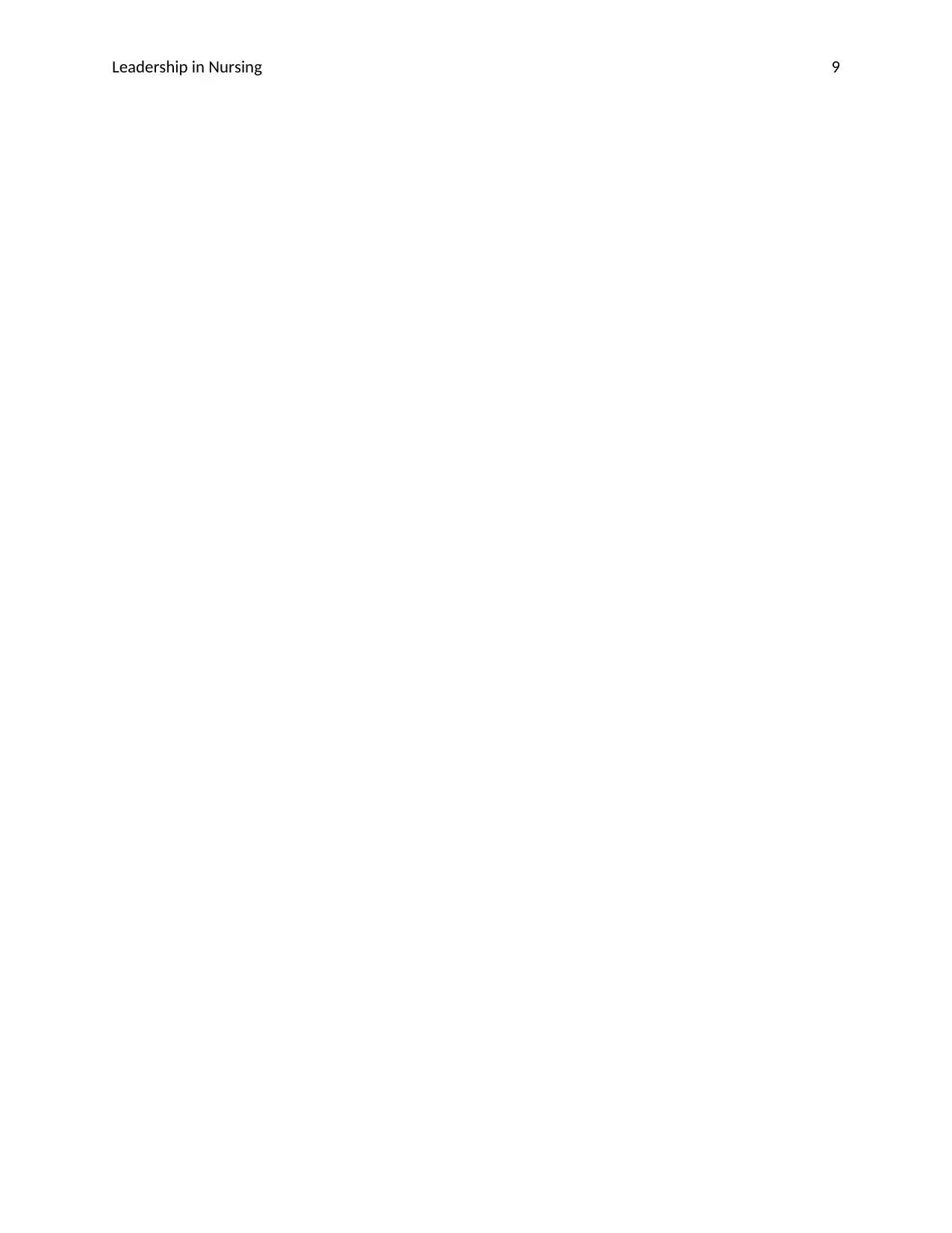
Leadership in Nursing 9
1 out of 10
Related Documents
Your All-in-One AI-Powered Toolkit for Academic Success.
+13062052269
info@desklib.com
Available 24*7 on WhatsApp / Email
![[object Object]](/_next/static/media/star-bottom.7253800d.svg)
Unlock your academic potential
Copyright © 2020–2025 A2Z Services. All Rights Reserved. Developed and managed by ZUCOL.





